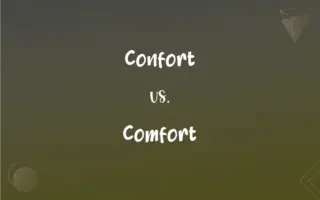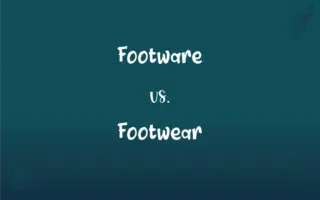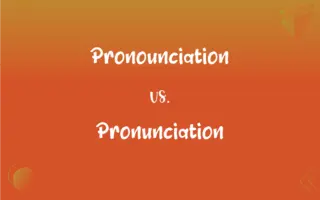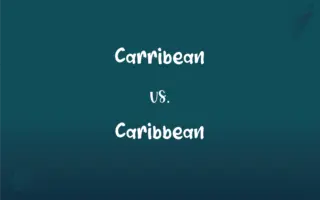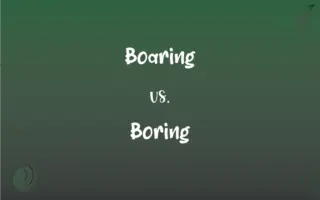Totaly vs. Totally: Mastering the Correct Spelling
Edited by Aimie Carlson || By Janet White || Published on March 29, 2024
"Totaly" is an incorrect spelling, while "totally" is correct, meaning completely or entirely. "Totally" emphasizes full extent or degree.

Which is correct: Totaly or Totally
How to spell Totally?

Totaly is Incorrect

Totally is Correct
ADVERTISEMENT
Key Differences
Think of "totally" as "total" plus "ly," emphasizing the addition of the adverbial suffix.
Recall that "total" is the root word; add "ly" to form "totally."
Remember, "all" in "totally" hints at its meaning of completeness, matching the double "l."
Note the double "l" in "totally," signifying completeness.
Practice spelling "total" first, then append "ly," reinforcing the correct structure.
ADVERTISEMENT
Correct usage of Totally
The movie was totaly different from the book.
The movie was totally different from the book.
It's totaly normal to feel nervous before a big presentation.
It's totally normal to feel nervous before a big presentation.
She was totaly unaware of the surprise party planned for her.
She was totally unaware of the surprise party planned for her.
I'm totaly exhausted after the long day.
I'm totally exhausted after the long day.
He totaly forgot about our meeting.
He totally forgot about our meeting.
Totally Definitions
To the fullest extent; wholly.
He's totally committed to his new project.
Absolutely, without exception.
The movie was totally different from the book.
Completely, in every part or aspect.
She was totally unaware of the surprise party planned for her.
Used for emphasis, to express agreement or affirmation.
I am totally in favor of your decision.
In a total manner; entirely.
The opinions of the critics were totally ignored.
Entirely; wholly; completely.
Totally Sentences
He was totally absorbed in his book and didn't hear me come in.
She was totally amazed by the magician's performance.
The situation was totally out of control.
The view from the top was totally breathtaking.
I'm totally convinced that this is the right decision.
The room was totally dark when I entered.
I totally agree with your point of view.
I totally forgot to call you back yesterday.
It's totally fine if you want to reschedule our meeting.
We're totally ready for the competition next week.
His story was totally unbelievable.
The house was totally quiet.
The movie was totally awesome; you should see it!
The test was totally hard; I hope I passed.
I was totally surprised by the ending of the book.
The concert was totally sold out.
I'm totally supportive of your decision.
I'm totally committed to finishing this project on time.
The city looks totally different at night.
I'm totally into this new band I discovered.
It's totally up to you to decide.
That's a totally different issue.
That joke was totally hilarious!
He's totally the best player on the team.
She's totally the smartest person I know.
Totally Idioms & Phrases
Totally on board
To be fully in agreement with a plan or idea.
After hearing the benefits, I'm totally on board with the new policy.
Totally off base
To be completely wrong about something.
His accusations were totally off base and unfounded.
Totally blown away
To be extremely impressed or overwhelmed by something.
I was totally blown away by her performance on stage.
Totally hit it off
To get along very well with someone from the beginning.
We totally hit it off and talked for hours.
Totally out of the blue
Something happening unexpectedly.
His decision to move to another country came totally out of the blue.
Totally off the mark
Not accurate or correct.
Your guess about the ending of the movie was totally off the mark.
Totally out of the question
Not possible or not allowed.
Staying out past midnight is totally out of the question.
Totally in the dark
To be completely unaware or uninformed about something.
We were totally in the dark about their plans to sell the house.
Totally out of character
Acting in a way that is not typical for a person.
Yelling at the waiter was totally out of character for her.
Totally off the grid
Not connected to utilities or telecommunications; also, off the radar.
They live totally off the grid in a cabin in the mountains.
Totally out of it
Not being in a normal state of mind, often due to tiredness or illness.
I was so tired after the flight that I was totally out of it.
Totally over the top
Excessively extravagant or extreme.
The decorations for the party were totally over the top.
Totally under the weather
Feeling ill.
I'm totally under the weather today, so I'll be staying in bed.
Totally up in the air
Uncertain or undecided.
Our vacation plans are still totally up in the air.
Totally beside oneself
To be very upset or emotional.
She was totally beside herself with worry until she heard her daughter was safe.
Totally in one's element
Being in a situation that one knows well and enjoys.
He's totally in his element when he's teaching.
Totally in sync
Being in perfect agreement or harmony.
The team worked totally in sync to complete the project on time.
Totally out of line
Behaving inappropriately or disrespectfully.
His comments were totally out of line and offended many people.
Totally by the book
Doing things strictly according to the rules or policies.
She does everything totally by the book, leaving no room for error.
Totally out of one's element
Not in a comfortable or familiar situation.
I was totally out of my element at the fancy gala.
FAQs
What is the verb form of totally?
"Totally" does not have a verb form as it is an adverb; the related verb would be "total."
What is the pronunciation of totally?
Totally is pronounced as /ˈtoʊ.təl.i/.
What is the root word of totally?
The root word is "total."
Which vowel is used before totally?
The vowel "a" is used in "total" before adding "ly" to form "totally."
Which conjunction is used with totally?
Conjunctions such as "and" or "but" can be used in sentences that include "totally."
What is the singular form of totally?
"Totally" does not have a singular or plural form as it is an adverb.
Why is it called totally?
It is called "totally" because it derives from "total," referring to the complete extent or degree.
Is totally a collective noun?
No, "totally" is not a noun.
What is the plural form of totally?
Adverbs do not have plural forms; "totally" remains the same.
Which article is used with totally?
Articles are not used with "totally" as it is an adverb.
Is totally a vowel or consonant?
The word "totally" starts with a consonant.
Which preposition is used with totally?
Prepositions are not typically used directly with "totally," as it modifies verbs, adjectives, or other adverbs.
Is totally a noun or adjective?
"Totally" is an adverb.
Is totally an adverb?
Yes, "totally" is an adverb.
Is totally a negative or positive word?
"Totally" is neutral; its connotation depends on the context.
Is totally a countable noun?
"Totally" is not a noun, so it is neither countable nor uncountable.
Is the totally term a metaphor?
"Totally" can be used metaphorically, depending on the context.
How many syllables are in totally?
There are three syllables in "totally."
What part of speech is totally?
"Totally" is an adverb.
What is the opposite of totally?
"Partially" or "somewhat."
Which determiner is used with totally?
Determiners are not used with adverbs like "totally."
What is the first form of totally?
"Totally" does not change form; it is always "totally."
What is the second form of totally?
There is no second form; "totally" remains constant.
What is the third form of totally?
As an adverb, "totally" does not have different forms.
What is a stressed syllable in totally?
The first syllable, "to," is stressed.
What is another term for totally?
"Completely" or "entirely."
How is totally used in a sentence?
"He was totally convinced that the plan would work."
Is totally an abstract noun?
"Totally" is not a noun; it is an adverb.
Is the word totally imperative?
"Totally" can be used in imperative sentences but is not imperative by itself.
How do we divide totally into syllables?
To-tal-ly.
About Author
Written by
Janet WhiteJanet White has been an esteemed writer and blogger for Difference Wiki. Holding a Master's degree in Science and Medical Journalism from the prestigious Boston University, she has consistently demonstrated her expertise and passion for her field. When she's not immersed in her work, Janet relishes her time exercising, delving into a good book, and cherishing moments with friends and family.
Edited by
Aimie CarlsonAimie Carlson, holding a master's degree in English literature, is a fervent English language enthusiast. She lends her writing talents to Difference Wiki, a prominent website that specializes in comparisons, offering readers insightful analyses that both captivate and inform.



















